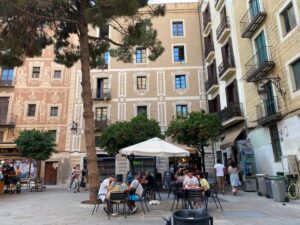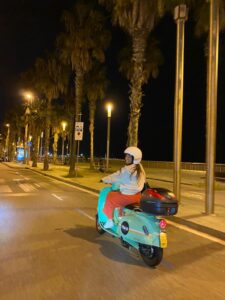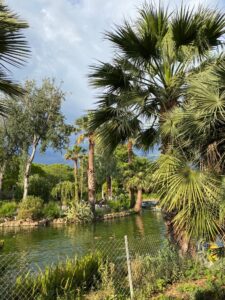Archive for December, 2021
My internship abroad in Barcelona
- Materialwissenschaft und Werkstofftechnik
- Spain, Barcelona
- BSport
- 01.03.2021-05.07.2021
Preparation
Preparation includes a few things such as funding opportunities from the university, whether you’d like to get the internship recognized (as a compulsory internship), finding an internship, finding accommodation, insurance. In general, it helped me to list everything and then decide which processes take the longest, such as documents from the university, because they’ll have to be signed by different parties, and then decide which things will have to be done first.
Finding an internship
When looking for an internship, I can recommend LinkedIn, as many offers are listed there clearly, or simply researching on the internet. In Spain, many things happen very quickly, so that there are often only two weeks between the application process and the first day of work. However, this depends on the size of the company.
Finding a flat
I can recommend spotahome for finding a flat. I found my flat here and was very satisfied. It is an agency that provides a lot of clear information about the flats, as well as video tours of almost all flats. In addition, if you don’t find everything as shown in the pictures, you can stay in a hotel at the agency’s expense until you find a new apartment.

©Hanna Johannsen
This is very important, as there is a lot of fraud in Spain regarding flats. For this, you pay a fee of about 250€ for booking the flat via the website. If you are on site, you can look for flats on Idealista, for example, and drop by the flat and save the agency fee. One difference I noticed here is that you often don’t know who your flatmates are. In Germany, there are always a lot of “flatmates”-castings, whereas in Spain you often only talk to the agent/ landlord and then have to decide whether you want to move in.
Insurance
As far as insurance is concerned, I contacted my own insurance company in Germany, as they often offer discounted additional offers for insurance abroad. In my case, it was the “Envivas” insurance through TK. In Spain, you are generally insured with public doctors/hospitals via your normal insurance card, which is also the so-called “European Health Insurance Card”. However, both my friends and I have not had very good experiences with this and would therefore recommend taking such additional insurance anyway. This way you can go to all doctors and will only have to submit the bill to the insurance company for reimbursement afterwards. In Spain, I noticed a huge difference in services between public institutions and private doctors.
Formalities on site
Once you arrive in Spain, you have to take care of “El Padronimiento” and the “NIE” number. “El Padronimiento” is the registration in Spain and the “NIE” is the foreigner identification number. The NIE number gives you many advantages regarding public transport systems and makes things easier. For both things you have to make an appointment online. This is possible for the registration, but impossible for the NIE number. Regarding the NIE number, there are now a lot of agencies that have made this a business, which you unfortunately have to submit to sooner or later, because it is almost impossible to get an appointment here. In my particular case, I got a number from a guy through friends of friends. I had to send him my passport number and a few days later pick up the document which is required for the appointment in some shop and pay 40€ in cash. Sounds strange looking back, but you have little choice and almost everyone does it this way. In some cases, the company helps you with the NIE number. This is a good thing to ask for in the interview. Once you get the appointment you have to be very careful to have all the documents exactly as requested, otherwise you will be send home very quickly.
Actually, registration and the NIE number have to be done at the beginning, but I know some people who didn’t take care of it at all or only much later. For a short stay, I would consider it, as the effort is very high.
I would definitely recommend sorting this out before your stay abroad. Firstly, for the documents, which have to be printed out and complete, and secondly, it is sometimes possible to apply for the NIE number at the Spanish embassies in Germany. This makes the process much easier.
Means of transport

©Hanna Johannsen
The main way to get around Barcelona is by metro. The metro system is very good, cheap and efficient. I always bought a 10-trip ticket, which costs about €11 (as of 2021). With this ticket you can also use the bus. For a longer stay, I would recommend the three-month ticket, which costs 80€ (as of 2021) and is therefore very worthwhile. However, you need the NIE number for this. You also need the NIE number to register for the bicycle system in Barcelona.
Here you pay 50€ (as of 2021) for a whole year and can always ride your bike for free for the first half hour. E-bikes are also available at the bike stations scattered around the city. Everything is very cheap. Personally, I also really liked riding a scooter – there are apps like “YEGO” or “Seat Mo” that make it super easy to rent a scooter and ride it around the city.
I really enjoyed it and had no problems with the traffic in Barcelona. With a normal B license you can drive a 50cc scooter and if you have had your license for three years you can even drive a 150cc scooter in Spain.
Everyday life/ free time

©Hanna Johannsen
The life in Barcelona is simply amazing.
There are so many things to do and something for everyone. The mountains are close by for cycling or hiking with unbelievably beautiful views. The beach and the sea are also close by.
The restaurant and nightlife culture gives the city such a nice atmosphere. I personally took dance lessons in Barcelona because there are also many good dance schools there.
In general, you were always in a good mood in Barcelona because the weather is so good, the architecture is so beautiful, and the city is so vivid. There is something exciting on every corner.
As for trips, I can recommend Montserrat, Mont-Rebei or Sitges.

©Hanna Johannsen
The train system in Catalonia was very cheap and efficient. You can travel very well to cities further away for little money and thus explore the Barcelona area very well.
Advices
In general, I can only recommend requesting a reasonable contract for the internship. The rights as an employee/intern are far away from those in Germany. The internship contract is the only safety you’ll have and extremely important. Even if there may not be many internship alternatives or the boss is hesitant about it. A clear contract is very important.
Even if the department or the supervisor does not offer it, always ask for a feedback-talk. This can prevent misunderstandings and helps a lot to develop and learn from the internship.
Otherwise, I find that a lot of things develop naturally, with flatmates, friends or finding one’s interests in a new city. Here, I’ve learned to not want everything at once and to stress out if it’s not the case. Everything has its time and will work out.
For me, it was such a great experience, and I would go to Barcelona again any time and can also imagine moving there later.
Kategorie: Barcelona, Business Administration and Engineering, Materials and Process Engineering, Spain
1 Comment »
-
Recent Posts
Recent Comments
Archives
- May 2024
- April 2024
- March 2024
- February 2024
- January 2024
- December 2023
- November 2023
- October 2023
- September 2023
- August 2023
- July 2023
- June 2023
- February 2023
- January 2023
- December 2022
- November 2022
- October 2022
- August 2022
- July 2022
- June 2022
- May 2022
- April 2022
- March 2022
- February 2022
- December 2021
- November 2021
- October 2021
- September 2021
- August 2021
- July 2021
Categories
- Allgemein
- Amsterdam
- Architecture
- Austria
- Barcelona
- Belgium
- Bilbao
- Biology
- Biomedical Engineering
- Biotechnology
- Bulgaria
- Business Administration and Engineering
- Chemistry
- Civil Engineering
- Computational Engineering Science
- Computer Science
- Construction and Robotics M.Sc.
- Copenhagen
- Course of Study
- Cyprus
- Denmark
- Dublin
- Electrical Engineering
- Energy Engineering
- Environmental Engineering
- Finland
- France
- Helsinki
- Hospital
- Host Country
- Ireland
- Italy
- Liechtenstein
- Luxembourg
- Madrid
- Materials and Process Engineering
- Mechanical Engineering
- Medicine
- Milan
- Molecular and Applied Biotechnology (MA)
- Netherlands
- Norway
- Oslo
- Other
- Psychology
- Romania
- Sevilla
- Simulation Sciences M.Sc.
- Slovenia
- Spain
- Sweden
- Teachers
- Toledo
- Tromso
- Trondheim
- Turkey
- United Kingdom
- United States of America
- Utrecht
- Vienna
Meta

